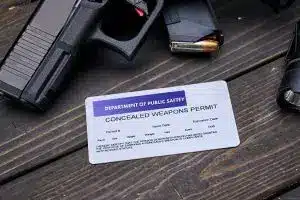In many instances, one state will recognize a license to carry issued in another state, but not always. Whether or not an LTC you have in Texas is valid in a different state depends on what applies with reciprocity. To give you a better idea of what applies as far as mutual LTC recognition goes, here’s a rundown of the states that have concealed carry reciprocity with Texas and some related facts you’ll want to know, brought to you by the firearms education pros from Online LTC, the ones to turn to when you want to take an LTC class.
Reciprocal vs. Unilateral
There are two main ways states can recognize a license to carry issued by another state. The first is with what’s known as reciprocity. This is when one state considers another state’s handgun license valid through statues or mutual agreements. There can also be unilateral LTC recognition, such as if Texas recognizes LTCs from a certain state that doesn’t recognize LTCs issued by Texas.
Reciprocal States
According to the Texas Department of Public Safety, more than 30 states have reciprocity agreements with Texas. It’s best to review the specifics of the reciprocity arrangements, since there are some states where certain guidelines apply. For instance, in Alabama, a Texas LTC is only recognized for license holders 21 years of age and older. This also applies in Colorado, Iowa, Nevada, and Nebraska. Additional states that have reciprocity with Texas include:
• Alaska
• Arizona
• Arkansas
• Delaware
• Florida
• Georgia
• Idaho
• Indiana
• Kansas
• Kentucky
• Louisiana
• Michigan
• Mississippi
• Missouri
• Montana
• New Mexico
• North Carolina
• North Dakota
• Ohio
• Oklahoma
• Pennsylvania
• South Carolina
• South Dakota
• Tennessee
• Utah
• Virginia
• West Virginia
• Wyoming
Unilateral States
If your goal is to be able to go from Texas to another state and be permitted to legally conceal carry, you’ll want to primarily focus on the reciprocity states we listed above. In states that are unilateral, you may still be able to carry a handgun in a concealed manner in some situations. For example, in Wisconsin, LTCs issued by Texas are recognized, but Wisconsin LTCs aren’t recognized by Texas. However, in Washington State, the unilateral agreement goes in the other direction—meaning Texas LTCs aren’t recognized in Washington.
No-Agreement States & Territories
You’ll be unable to legally conceal carry a handgun in states or territories that have no agreements at all with Texas regarding LTCs. These locations are:
• American Samoa
• District of Columbia
• Guam
• Maine
• Minnesota
• New Hampshire
• Northern Mariana Islands
• Oregon
• Puerto Rico
• U.S. Virgin Islands
Being Prepared with an LTC when Traveling with Your Firearm
In Texas, a license to carry is no longer required if you meet the eligibility requirements. However, if you wish to take advantage of the benefits an LTC provides and legally conceal carry in another state, you’ll need an LTC if it’s a state that has reciprocity with Texas or a unilateral agreement that favors Texas. It’s equally important to fully brush up on the laws that apply to handguns and firearms in general when you have plans to travel and carry—especially in states you’ll just be passing through on your way to your intended destination.
If you need to complete the necessary course to get your LTC, make sure to choose a premier training provider. Online Texas LTC is committed to offering the best firearms training possible. When they need information on firearms safety or they want to take a license to carry Texas class, gun owners trust the expertise of the pros from Online Texas LTC. If you have questions about any aspect of gun ownership in Texas, give us a call today at 512-675-2206.





